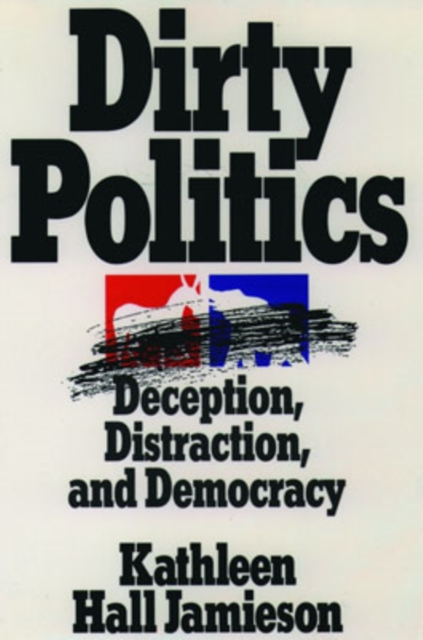Dirty Politics: Deception, Distraction, and Democracy

Dirty Politics: Deception, Distraction, and Democracy
In Dirty Politics, campaign analyst Kathleen Hall Jamieson provides an eye-opening look at political ads and speeches, showing us how to read, listen to, and watch political campaigns. Jamieson provides a sophisticated (and often humorous) analysis of advertising technique, describing how television ads use soft focus, slow motion, lyrical or patriotic music (Reagan used "I'm Proud to be an American") to place a candidate in a positive light, or quick cuts, black and white, videotape, and ominous music (for instance, the theme from "Jaws") to portray the opposition. She shows how ads sometimes mimic news spots to add authenticity (Edwin Edwards, in his race against David Duke, actually used former NBC correspondent Peter Hackis, who would begin an ad saying "This is Peter Hackis in Baton Rouge"). And Jamieson points out that consultants create inflammatory ads hoping that the major networks will pick them up and run them as news, giving the ad millions of dollars of free air time. The most striking example would be the Willie Horton ad, which the press aired repeatedly (as an example of negative advertising) long after the ad had ceased running. (In fact, it never ran on the major networks as an ad, only as news.)
From a colorful, compact history of negative campaigning from Eisenhower to the present, to an in-depth commentary on the Willie Horton ads, to an up-to-the-minute analysis of the Duke-Edwards campaign in Louisiana, Dirty Politics is both a fascinating look at underhanded campaigning as well as a compelling argument for fair, accurate, and substantive campaigns. It is a book that all voters should read before they vote again.
PRP: 343.49 Lei
Acesta este Prețul Recomandat de Producător. Prețul de vânzare al produsului este afișat mai jos.
309.14Lei
309.14Lei
343.49 LeiIndisponibil
Descrierea produsului
In Dirty Politics, campaign analyst Kathleen Hall Jamieson provides an eye-opening look at political ads and speeches, showing us how to read, listen to, and watch political campaigns. Jamieson provides a sophisticated (and often humorous) analysis of advertising technique, describing how television ads use soft focus, slow motion, lyrical or patriotic music (Reagan used "I'm Proud to be an American") to place a candidate in a positive light, or quick cuts, black and white, videotape, and ominous music (for instance, the theme from "Jaws") to portray the opposition. She shows how ads sometimes mimic news spots to add authenticity (Edwin Edwards, in his race against David Duke, actually used former NBC correspondent Peter Hackis, who would begin an ad saying "This is Peter Hackis in Baton Rouge"). And Jamieson points out that consultants create inflammatory ads hoping that the major networks will pick them up and run them as news, giving the ad millions of dollars of free air time. The most striking example would be the Willie Horton ad, which the press aired repeatedly (as an example of negative advertising) long after the ad had ceased running. (In fact, it never ran on the major networks as an ad, only as news.)
From a colorful, compact history of negative campaigning from Eisenhower to the present, to an in-depth commentary on the Willie Horton ads, to an up-to-the-minute analysis of the Duke-Edwards campaign in Louisiana, Dirty Politics is both a fascinating look at underhanded campaigning as well as a compelling argument for fair, accurate, and substantive campaigns. It is a book that all voters should read before they vote again.
Detaliile produsului










